
Ecology Matters
By Ecological Society of Australia
What do ecologists do? What happens when they hit bumps and twists in their career path? How do they end up studying sometimes strange and obscure species? And why are partnerships and communication more than just trendy buzzwords when it comes to ecology?
Help support ecology in Australia - www.ecolsoc.org.au/get-involved/donate/donation-form
The music in this podcast is ‘Glow’ by Scott Buckley - www.scottbuckley.com.au

Ecology MattersOct 17, 2023

A/Prof Emilie Ens
"The Elders that I have met over that time, they have really influenced my thinking and inspired me to keep going."
Emilie Ens is an Associate Professor at Macquarie University where she leads the Cross-Cultural Ecology and Environmental Management lab. She is passionate about creating respectful cross-cultural partnerships with Indigenous people and organisations to better understand and manage Australia’s diverse ecosystems.
Emilie and her team have won a number of Awards for their cross-cultural work including Banksia, Eureka and Australian Academy of Science Awards, and in 2022 Emilie was awarded the ESA Members Service Prize in recognition of her outstanding contributions to Australian ecology.
The Ecological Society of Australia acknowledges the Traditional Owners and Custodians of country throughout Australia and their connections to land, sea and community. We pay our respects to their Elders past, present and emerging. Macquarie University is situated on the lands of the Wallamattagal clan of the Dharug Nation.
Help the ESA support ecology in Australia by donating (www.ecolsoc.org.au/get-involved/donate/donation-form) or by becoming a member (www.ecolsoc.org.au/get-involved/become-a-member).
The music in this podcast is ‘Glow’ by Scott Buckley - www.scottbuckley.com.au.
Episode image credit: Emilie Ens.

Adam Yaney-Keller
"That's an issue that affects an animal over time, as they grow, and as these entanglements constrict them."
We have known for decades that plastic pollution has a detrimental impact on marine life. We know that species like the Australian fur seal are heavily affected. And yet, there are many questions we do not have answers to: How does entanglement affect the growth, behaviour and survival of young seals? Where do these seals forage and disperse in relation to plastic accumulation and fishing hotspots within Bass Strait?
Adam Yaney-Keller is attempting to answer those questions in his PhD with Monash University and Phillip Island Nature Parks.
The Ecological Society of Australia acknowledges the Traditional Owners and Custodians of country throughout Australia and their connections to land, sea and community. We pay our respects to their Elders past, present and emerging. Adam lives and works on the traditional land and sea Country of the Bunurong people.
Help the ESA support ecology in Australia by donating (www.ecolsoc.org.au/get-involved/donate/donation-form) or by becoming a member (www.ecolsoc.org.au/get-involved/become-a-member).
The music in this podcast is ‘Glow’ by Scott Buckley - www.scottbuckley.com.au.
Episode image credit: Philip Island Nature Parks / Adam Yaney-Keller.

Renske Jongen
"My ultimate goal would be to enhance the way we restore seagrasses at the moment."
Joining us today is University of Sydney PhD candidate Renske Jongen. Renske’s career has taken her from dreams of veterinary science, to studying the effect of climate change on winter moths in the Netherlands and juvenile fish species in South Australia. She is now investigating the role of sediment microbes in seagrass response to environmental stress and how we can use that knowledge to aid restoration of seagrass beds.
Renske was awarded the inaugural 2022 Peter Fairweather Student Conference Support Award.
The Ecological Society of Australia acknowledges the Traditional Owners and Custodians of country throughout Australia and their connections to land, sea and community. We pay our respects to their Elders past, present and emerging. Renske works on the lands of the Gadigal and Cammeraigal people of the Eora Nation.
Help the ESA support ecology in Australia by donating (www.ecolsoc.org.au/get-involved/donate/donation-form) or by becoming a member (www.ecolsoc.org.au/get-involved/become-a-member).
The music in this podcast is ‘Glow’ by Scott Buckley - www.scottbuckley.com.au.
Episode image credit: Renske Jongen

Lynda Maybanks and Eleanor McCall
"We're [...] using language to inform the restoration and environmental work that we do."
We are lucky to have two guests this episode. Lynda Maybanks is managing director of Wirrinyah First Nations Conservation Services, an Engagement Consultant with Maybanks Consultancy, and Manager of the Yugara Dancers in Ipswich. Eleanor McCall is a linguist and a Masters student at the University of Queensland, researching links between Aboriginal land management practices and language revival.
Lynda and Eleanor were awarded the 2022 Bush Heritage Australia Indigenous-led science prize.
The Ecological Society of Australia acknowledges the Traditional Owners and Custodians of country throughout Australia and their connections to land, sea and community. We pay our respects to their Elders past, present and emerging. Lynda and Eleanor live and work on Yagara country.
Help the ESA support ecology in Australia by donating (www.ecolsoc.org.au/get-involved/donate/donation-form) or by becoming a member (www.ecolsoc.org.au/get-involved/become-a-member).
The music in this podcast is ‘Glow’ by Scott Buckley - www.scottbuckley.com.au.
Episode image credit: Wirrinyah First Nations Conservation Services.

Dr Judy Dunlop
"I've always been kind of fascinated with what the landscape would have looked like before Europeans got here."
Our guest today is Dr Judy Dunlop. Judy focuses on the threatened mammals of Western Australia and has played key roles in large scale fauna reintroduction and translocation programs. In 2022 she co-authored a paper looking at the role of parasites during translocation. She joined Ecology Matters to discuss why it’s sometimes important for mammals to keep these parasites and for conservation managers to resist that urge to give them the flick. This paper was awarded the 2022 Austral Award.
Judy is a research scientist with the Western Australian Department of Parks and Wildlife and is Executive Officer with the Western Australian Feral Cat Working Group.
The Ecological Society of Australia acknowledges the Traditional Owners and Custodians of country throughout Australia and their connections to land, sea and community. We pay our respects to their Elders past, present and emerging. While Judy works all over the continent, she lives on Whadjuk Noongar country.
Help the ESA support ecology in Australia by donating (www.ecolsoc.org.au/get-involved/donate/donation-form) or by becoming a member (www.ecolsoc.org.au/get-involved/become-a-member).
The music in this podcast is ‘Glow’ by Scott Buckley - www.scottbuckley.com.au.
Episode image credit: Judy Dunlop

Professor John Woinarski
"One of the most outstanding conservation concerns in Australia [...] is the extent of loss of [...] endemic mammal species."
Professor John Woinarski has been involved in research, policy and management of Australian biodiversity for over 40 years. His career has crossed several fields, including reserve design, fire ecology, biodiversity monitoring, invasive species, the impacts of forestry, pastoralism and mining, and island biogeography.
He has been awarded a Eureka Prize for biodiversity research, a Serventy Medal for life-time contribution to Australian ornithology and an Australian Natural History Medallion.
He sat down with us during the 2023 ESA conference in Darwin to discuss the impacts of feral cats on wildlife.
The Ecological Society of Australia acknowledges the Traditional Owners and Custodians of country throughout Australia and their connections to land, sea and community. We pay our respects to their Elders past, present and emerging. While his work takes him across the continent, John lives on the lands of the Wurundjeri people.
Help the ESA support ecology in Australia by donating (www.ecolsoc.org.au/get-involved/donate/donation-form) or by becoming a member (www.ecolsoc.org.au/get-involved/become-a-member).
The music in this podcast is ‘Glow’ by Scott Buckley - www.scottbuckley.com.au.
Episode image credit: phototrip from Getty Images (via Canva)

Dr Richard McLellan
"There are a number of criteria for keystone resources and sandalwood [...] fits quite a few of them."
Our guest this episode is Dr Richard McLellan. Richard is an experienced ecologist, conservationist, and program manager. He held senior positions within WWF-Australia and WWF-International, focusing on native vegetation management, forest conservation, sustainable resource use, and ecological footprint reduction. He is the chair of the Forest Conservation Fund and the Gunduwa Regional Conservation Association, an ambassador for the Western Australian Parks Foundation, and a long-time member of the World Commission on Protected Areas.
In his spare time, Richard recently completed his PhD with Charles Sturt University and Bush Heritage Australia on the ecological importance of Australian sandalwood in Australia's rangelands.
The Ecological Society of Australia acknowledges the Traditional Owners and Custodians of country throughout Australia and their connections to land, sea and community. We pay our respects to their Elders past, present and emerging. Richard works on the lands of the Yamaji, Nanda, Badimia, Martu, and Wajarri-Yamaji peoples.
Help the ESA support ecology in Australia by donating (www.ecolsoc.org.au/get-involved/donate/donation-form) or by becoming a member (www.ecolsoc.org.au/get-involved/become-a-member).
The music in this podcast is ‘Glow’ by Scott Buckley - www.scottbuckley.com.au.
Episode image credit: Richard McLellan.

Meghan Shaw
"We only know about the species that we are exposed to."
A picture is worth a thousand words, or so they say. Our guest this episode is looking at precisely this idea - what role do wildlife images play in conservation? How can images influence public attitudes and behaviours towards wildlife? And what effect does this have on long term wildlife conservation? Meghan Shaw is a PhD candidate at Deakin University looking into these big-picture ideas.
The Ecological Society of Australia acknowledges the Traditional Owners and Custodians of country throughout Australia and their connections to land, sea and community. We pay our respects to their Elders past, present and emerging. Meghan works on the lands of the Bunurong and Wurundjeri people in Australia and on the lands of the Dakota in the United States.
Help the ESA support ecology in Australia by donating (www.ecolsoc.org.au/get-involved/donate/donation-form) or by becoming a member (www.ecolsoc.org.au/get-involved/become-a-member).
The music in this podcast is ‘Glow’ by Scott Buckley - www.scottbuckley.com.au.
Episode image credit: Rob Davis from Getty Images (via Canva)

Oli Aylen
"Nobody has looked at whether [fenced reserves] could potentially be a conservation measure for bats."
Bats are the second most-diverse order of mammals, in Australia and around the world, and provide vital ecosystem services like pest control and pollination. However, more than 30 percent of bat species are threatened, largely due to habitat alteration and introduced predators.
In this episode, UNSW Sydney PhD student Oli Aylen joins us to discuss this fascinating group of animals and to outline his research on the role of fenced conservation reserves on bat communities in arid zones.
The Ecological Society of Australia acknowledges the Traditional Owners and Custodians of country throughout Australia and their connections to land, sea and community. We pay our respects to their Elders past, present and emerging. Oli works on the lands of the Wangkumara and Kokatha people.
Help the ESA support ecology in Australia by donating (www.ecolsoc.org.au/get-involved/donate/donation-form) or by becoming a member (www.ecolsoc.org.au/get-involved/become-a-member).
The music in this podcast is ‘Glow’ by Scott Buckley - www.scottbuckley.com.au.
Episode image credit: Oli Aylen.

Hayleigh Graham and Dr Jenn Lavers
"We know so little about the variety of species that exist on these spectacular islands."
Dr Jenn Lavers and ranger Hayleigh Graham work with the Tjaltjraak Native Title Aboriginal Corporation to understand and protect the delicate ecosystems of the Esperance region along the south coast of Western Australia.
They joined Ecology Matters to talk about their efforts to restore seabird colonies on some of their offshore islands, and the importance of cultural burning to these species.
The Ecological Society of Australia acknowledges the Traditional Owners and Custodians of country throughout Australia and their connections to land, sea and community. We pay our respects to their Elders past, present and emerging. Hayleigh and Jenn work on the lands of the Wudjari people.
Help the ESA support ecology in Australia by donating (www.ecolsoc.org.au/get-involved/donate/donation-form) or by becoming a member (www.ecolsoc.org.au/get-involved/become-a-member).
The music in this podcast is ‘Glow’ by Scott Buckley - www.scottbuckley.com.au.
Episode image credit: Jenn Lavers.

Dr Elodie Camprasse
"A lot of people just don’t realise what we have in our blue backyard on the Southern shores of Australia, and how precious that is."
Dr Elodie Camprasse is a Research Fellow at Deakin University and citizen science project lead with 'Spider Crab Watch'.
Every winter, spider crabs gather in huge underwater piles along Australia’s southern shores. The spectacular gatherings attract considerable attention, even featuring in a BBC documentary, but scientists know very little about the species. How many spider crabs are there? Where do they go after they disperse? What signals to the crabs that it is time to come together? Why do the crabs congregate in one location for several consecutive years then not return?
Listen as Elodie discusses these mysterious creatures and the importance of the Great Southern Reef.
The Ecological Society of Australia acknowledges the Traditional Owners and Custodians of country throughout Australia and their connections to land, sea and community. We pay our respects to their Elders past, present and emerging. Elodie works on the lands of the Wurundjeri, Wadawurrung and Bunurong peoples of the Eastern Kulin.
Help the ESA support ecology in Australia by donating (www.ecolsoc.org.au/get-involved/donate/donation-form) or by becoming a member (www.ecolsoc.org.au/get-involved/become-a-member).
The music in this podcast is ‘Glow’ by Scott Buckley - www.scottbuckley.com.au.
Episode image credit: Elodie Camprasse.

A/Prof John Morgan
"I got interested in plants as ways of regenerating landscapes."
Associate Professor John Morgan is a plant ecologist with the Research Centre for Applied Alpine Ecology and the Research Centre for Future Landscapes, at La Trobe University. He is a leading authority on the ecology of native grasslands in Australia, specialising in understanding how disturbances like fire and grazing determine the long-term dynamics of plant communities.
We caught up with John at the 2022 ESA conference in Wollongong where he received the Australian Ecology Research Award.
The Ecological Society of Australia acknowledges the Traditional Owners and Custodians of country throughout Australia and their connections to land, sea and community. We pay our respects to their Elders past, present and emerging. John works across the continent, including on the lands of the Gunaikurnai, Jaithmathang, Taungurung, Dhudhuroa, Dja Dja Wurrung, Baraba Baraba, Gunditjmara, Jardwadjali, Wadawurrung, Wurundjeri and Larrakia people.
Help the ESA support ecology in Australia by donating (www.ecolsoc.org.au/get-involved/donate/donation-form) or by becoming a member (www.ecolsoc.org.au/get-involved/become-a-member).
The music in this podcast is ‘Glow’ by Scott Buckley - www.scottbuckley.com.au.
Episode image credit: John Morgan.

Georgia Watson
"I can see myself definitely advocating for Antarctic protection and climate action for the rest of my life."
When you think of Antarctica, do you imagine patches of verdant green? Moss beds so dense they support their own microecosystems? Georgia Watson joined Ecology Matters to share her work on these important, and largely unknown, sentinels of Antarctica. And she also came to explain why actually talking about them, and about Antarctica more generally, is so important.
Hear how she moved through projects in forest ecology with Prof Kris French and Dr Luke Collins, to her work as research officer within the ARC SRI Securing Antarctica's Environmental Future at the University of Wollongong.
Georgia has been named as part of the 2023 Homeward Bound cohort. Sponsor her journey here: https://chuffed.org/project/gwdoeshb8
The Ecological Society of Australia acknowledges the Traditional Owners and Custodians of country throughout Australia and their connections to land, sea and community. We pay our respects to their Elders past, present and emerging. Georgia works on the lands of the Dharawal people.
Help the ESA support ecology in Australia by donating (www.ecolsoc.org.au/get-involved/donate/donation-form) or by becoming a member (www.ecolsoc.org.au/get-involved/become-a-member).
The music in this podcast is ‘Glow’ by Scott Buckley - www.scottbuckley.com.au.
Episode image credit: Georgia Watson

Ecology Matters - Season 2 Trailer
What do ecologists do? What happens when they reach those inevitable bumps and twists in their career path? How do they end up studying sometimes strange and obscure species? And why are partnerships and communication more than just trendy buzzwords when it comes to ecology?
Welcome to Ecology Matters, a podcast from the Ecological Society of Australia, where we explore these questions and more.
Learn more about the ESA - www.ecolsoc.org.au
The music in this podcast is ‘Glow’ by Scott Buckley - www.scottbuckley.com.au

Dr Holly Bradley
"It’s important not to just conserve the skinks because of their ecological significance but also importance to people and culture."
Dr Holly Bradley is a Research Fellow at Curtin University. As part of her PhD, Holly worked in partnership with the Badimia people of Western Australia to study the Western Spiny-tailed Skink.
As a result of that work, Holly and her Badimia colleagues are writing a dual language picture book, that will act as a teaching resource and a way of conserving the critically endangered Badimia language.
Holly was awarded the 2022 Next Generation Ecologist Award to support this project.
The Ecological Society of Australia acknowledges the Traditional Owners and Custodians of country throughout Australia and their connections to land, sea and community. We pay our respects to their Elders past, present and emerging. Holly works on the lands of the Badimia and Whadjuk people.
Help the ESA support ecology in Australia by donating (www.ecolsoc.org.au/get-involved/donate/donation-form) or by becoming a member (www.ecolsoc.org.au/get-involved/become-a-member).
The music in this podcast is ‘Glow’ by Scott Buckley - www.scottbuckley.com.au.
Episode image credit: Holly Bradley

What's all the fuss about science communication?
“It's important to think about how you get the broader public to understand why what you've done is important.”
We’re pleased to bring you this special bonus episode of Ecology Matters, all about why communicating ecological science is important.
Professor Richard Kingsford is a well-known and well-respected river ecologist who is regularly sought by media to comment on water and wetland-related issues.
In this episode, Professor Kingsford explains why communicating to the broader public should be an essential consideration for every scientist and why the outcomes of speaking truth to power can be much greater than potential short term costs.
Professor Kingsford has been awarded Fellowships of both the Royal Society of NSW and the Australian Zoological Society. He was awarded a Eureka Prize for Promoting Understanding of Science in 2008 and in 2021 received the ESA Gold Medal for his outstanding contributions to ecology.
The Ecological Society of Australia acknowledges the Traditional Owners and Custodians of country throughout Australia and their connections to land, sea and community. We pay our respects to their Elders past, present and emerging.
Help the ESA support ecology in Australia by donating (www.ecolsoc.org.au/get-involved/donate/donation-form) or by becoming a member (www.ecolsoc.org.au/get-involved/become-a-member).
The music in this podcast is ‘Glow’ by Scott Buckley - www.scottbuckley.com.au.
Episode image credit: Kawinwit Kittipalawattanapol
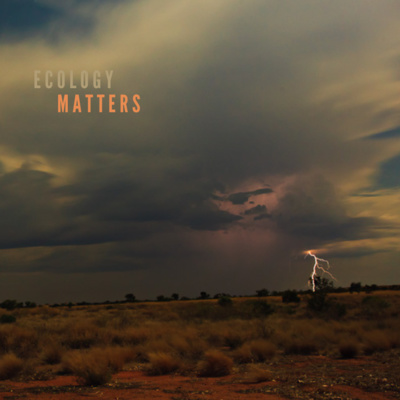
Dr Heather Neilly
“Understanding how disturbance changes things within a system to me seemed a fundamental way to actually manage and restore landscapes more effectively.”
Dr Neilly is a postdoctoral researcher with the Australian Landscape Trust, based at Calperum Station in South Australia.
Her work focuses on how disturbances can alter the structure of vegetation and affect fauna. With colleagues, she is looking at how features such as spinifex grass perform as thermal refuges for small reptiles and mammals under a range of different fire and grazing treatments.
Dr Neilly’s outstanding work was awarded the 2021 Wiley Next Generation Ecologist Award.
The Ecological Society of Australia acknowledges the Traditional Owners and Custodians of country throughout Australia and their connections to land, sea and community. We pay our respects to their Elders past, present and emerging. Dr Neilly works on the lands of the First Peoples of the River Murray and Mallee.
Help the ESA support ecology in Australia by donating (www.ecolsoc.org.au/get-involved/donate/donation-form) or by becoming a member (www.ecolsoc.org.au/get-involved/become-a-member).
The music in this podcast is ‘Glow’ by Scott Buckley - www.scottbuckley.com.au.
Episode image credit: Aaron Greenville
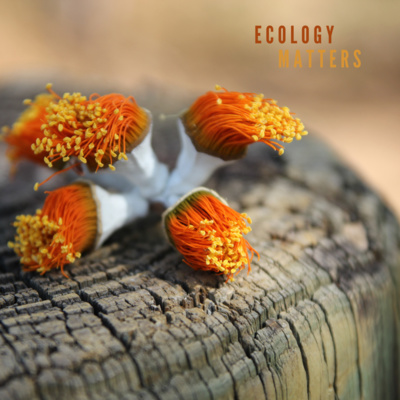
Professor Kristine French
“The best qualities of leadership are listening to people and building a path forward that is inclusive of everybody else's ideas.”
Professor French is Director of the Janet Cosh Herbarium at the University of Wollongong.
She has spent almost thirty years investigating the impact of disturbances on ecosystems, with a broad focus on environmental weeds and threatened species.
Her expertise has been sought by both state and national levels of government, and she has played significant roles in developing management strategies for species such as lantana and bitou bush.
Professor French won a Eureka Prize in 2008 for helping to lead the national Birds in Backyards program. She has been both Vice President and President of the Ecological Society of Australia and has been awarded the ESA Members Service Prize as well as the ESA Gold Medal.
The Ecological Society of Australia acknowledges the Traditional Owners and Custodians of country throughout Australia and their connections to land, sea and community. We pay our respects to their Elders past, present and emerging.
Help the ESA support ecology in Australia by donating (www.ecolsoc.org.au/get-involved/donate/donation-form) or by becoming a member (www.ecolsoc.org.au/get-involved/become-a-member).
The music in this podcast is ‘Glow’ by Scott Buckley - www.scottbuckley.com.au.
Episode image credit: Anna Rigosi
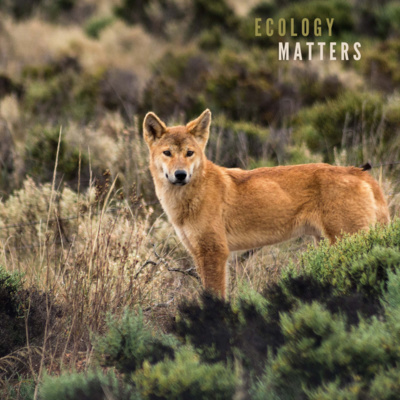
Professor Euan Ritchie
“If you maintain that curiosity and pursue your passions in ecology and conservation, you know, I don't know anyone who hasn't gone on to wonderful things by doing that.”
Professor Ritchie leads the Applied Ecology and Conservation Research group in the Centre for Integrative Ecology and School of Life and Environmental Sciences at Deakin University.
He has been a finalist in the Eureka Prizes three times:
- the 2013 Eureka Prize for Environmental Research as part of a team demonstrating that large predators like dingoes can affect the behaviour and abundance of invasive predators and herbivores such as the red fox, feral cat and feral goat.
- the 2020 Eureka Prizes as part of a large, national team examining the impact and management of feral cats in Australia.
More widely he has become a prolific science communicator, appearing regularly on television, in print and on radio. For this he was a finalist in the 2022 Eureka Prizes for his work promoting the understanding of science.
In 2021 he was awarded the Australian Ecology Research Award in recognition for his outstanding ecological research.
The Ecological Society of Australia acknowledges the Traditional Owners and Custodians of country throughout Australia and their connections to land, sea and community. We pay our respects to their Elders past, present and emerging. Euan works on the land of the Wurundjeri people of the Kulin nations.
Help the ESA support ecology in Australia by donating (www.ecolsoc.org.au/get-involved/donate/donation-form) or by becoming a member (www.ecolsoc.org.au/get-involved/become-a-member).
The music in this podcast is ‘Glow’ by Scott Buckley - www.scottbuckley.com.au.
Episode image credit: Christine Cooper

Ebony Potts
“Doing something that is so novel, and something where we could probably start making changes now, is super exciting.”
Tropical forests are increasingly at risk of fire, largely as a result of climate change and the impact of agricultural and logging practices. Ebony completed her Honours research looking at the flammability of tropical forest species and has now started a PhD extending this work.
She won the 2021 Applied Forest Ecology Scholarship for this research as well as the 2020 Sir Joseph Banks Medal for excellence in botany from James Cook University.
The Ecological Society of Australia acknowledges the Traditional Owners and Custodians of country throughout Australia and their connections to land, sea and community. We pay our respects to their Elders past, present and emerging. Ebony conducts her research on the traditional lands of the Yirrganydji and Yindinji peoples.
Help the ESA support ecology in Australia by donating (www.ecolsoc.org.au/get-involved/donate/donation-form) or by becoming a member (www.ecolsoc.org.au/get-involved/become-a-member).
The music in this podcast is ‘Glow’ by Scott Buckley - www.scottbuckley.com.au.
Episode image credit: Erika Roper

Patt Finnerty
“I’m trying to understand how we can use or manipulate herbivore foraging behaviour just using plant odour rather than having to use fences or shooting or all these quite abrasive control methods."
Patt is a PhD candidate at the University of Sydney and was awarded the 2021 Jill Landsberg Trust Fund Scholarship.
With his supervisors, Patt was among the first to show that mammalian herbivores like the swamp wallaby and the African elephant, use smell to find and choose between food options. Now, Patt is looking at whether introducing the smell of less-favoured or unpalatable plants can be used to deter herbivores from other, high-value plants.
Patt’s research aims to provide alternatives to lethal control or fencing for land managers wishing to protect ecologically or economically valuable plants from browsing damage.
The Ecological Society of Australia acknowledges the Traditional Owners and Custodians of country throughout Australia and their connections to land, sea and community. We pay our respects to their Elders past, present and emerging. Patt conducts his research on the traditional lands of the Kurrin-gai.
Help the ESA support ecology in Australia by donating (www.ecolsoc.org.au/get-involved/donate/donation-form) or by becoming a member (www.ecolsoc.org.au/get-involved/become-a-member).
The music in this podcast is ‘Glow’ by Scott Buckley - www.scottbuckley.com.au.
Episode image credit: Henry Lydecker
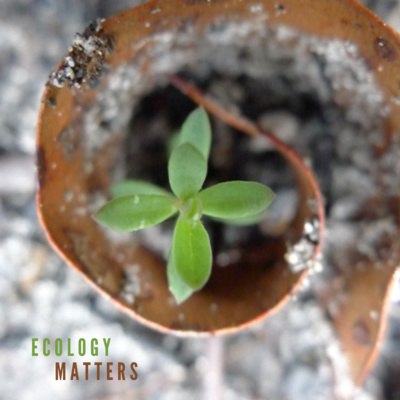
Giancarlo Chiarenza
“Can you imagine you have little to no nitrogen and you put all the nitrogen that you have in these young leaves that are just doomed? That's not very smart. Plants are smarter than that!”
Gian is a PhD candidate at the University of New South Wales, investigating the mechanisms behind delayed greening in plants.
Delayed greening occurs when plants withhold chlorophyll from leaves until they’re mature, resulting in the young expanding leaves being a myriad of colours, from red and pink to purple. Delaying the input of chlorophyll in this way may help the plant to reduce its loss of nutrients to herbivores. This makes sense when you consider that young leaves are often more tender, and therefore more appealing to herbivores than the tougher mature leaves. Gian plans to look at whether the withholding of chlorophyll from young leaves is linked to soil fertility, a question particularly pertinent in Australia, where many regions are known for their nutrient-poor soils.
His research received the 2021 Wiley Fundamental Ecology Award.
The Ecological Society of Australia acknowledges the Traditional Owners and Custodians of country throughout Australia and their connections to land, sea and community. We pay our respects to their Elders past, present and emerging. Gian conducts his research on the traditional lands of the Gadigal and Bedegal people.
Help the ESA support ecology in Australia by donating (www.ecolsoc.org.au/get-involved/donate/donation-form) or by becoming a member (www.ecolsoc.org.au/get-involved/become-a-member).
The music in this podcast is ‘Glow’ by Scott Buckley - www.scottbuckley.com.au.
Episode image credit: Alison Haynes
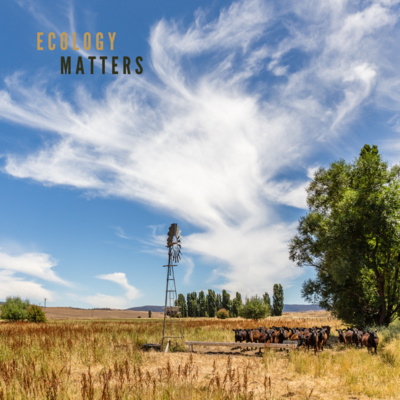
Dr Sacha Jellinek
“Over time I understood that you can't really protect the local environment without involving the local communities, without involving landowners.”
Dr Jellinek is a research fellow with the University of Melbourne and Melbourne Water. He has a particular interest in restoration ecology and the role that local communities play in natural resource management. He has worked as an ecologist for WWF, Greening Australia and the South Australian State Government and in 2021 won the ESA Members Service Prize.
The Ecological Society of Australia acknowledges the Traditional Owners and Custodians of country throughout Australia and their connections to land, sea and community. We pay our respects to their Elders past, present and emerging. The Traditional Owners of the lands on which Sacha works are the Wurundjeri Woi Wurrung.
Help the ESA support ecology in Australia by donating (www.ecolsoc.org.au/get-involved/donate/donation-form) or by becoming a member (www.ecolsoc.org.au/get-involved/become-a-member).
The music in this podcast is ‘Glow’ by Scott Buckley - www.scottbuckley.com.au.
Episode image credit: Dominic Ruefenacht
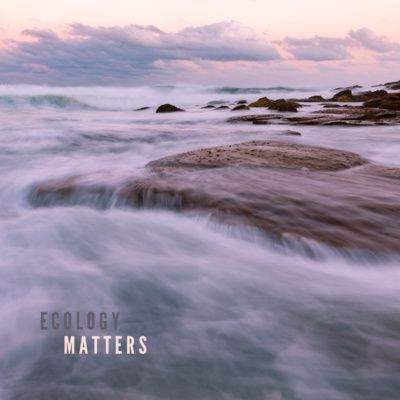
Mel Wilson
“It was a dream come true to come back and work for the Park so I often feel like I've got the best job in the world.”
Mel Wilson is the Natural Resource Manager of the Norfolk Island National Park. In partnership with PhD student Allie Nance, Mel designed an innovative way to manage invasive rodent populations on Norfolk Island. This work has led to improvements in the way that endemic plant and animal species on the island, including the endangered Norfolk Island Green Parrot, are protected from rodents.
For this work Mel was awarded the Ecological Impact Award in 2021.
The Ecological Society of Australia acknowledges the Traditional Owners and Custodians of country throughout Australia and their connections to land, sea and community. We pay our respects to their Elders past, present and emerging. We acknowledge the islanders of Pitcairn descent and their families as the custodians of Norfolk Island.
Help the ESA support ecology in Australia by donating (www.ecolsoc.org.au/get-involved/donate/donation-form) or by becoming a member (www.ecolsoc.org.au/get-involved/become-a-member).
The music in this podcast is ‘Glow’ by Scott Buckley - www.scottbuckley.com.au.
Episode image credit: Dominic Ruefenacht

Allie Nance
“That's the whole reason why conservation researchers are in this field, right, because we want to make a difference and we want our research to help.”
Allie is completing her PhD looking at the nesting success of endemic songbirds on Norfolk Island, which includes understanding invasive rodent populations and designing innovative control methods.
Invasive rodents are seen as a key threat to native plant and animal species on Norfolk Island, including breeding seabirds and the endangered Norfolk Island Green Parrot.
Allie’s research has already led to changes in the way that rodents are monitored and controlled on the island. It has also been incorporated into the current review of the Norfolk Island Region Threatened Species Recovery Plan.
*Since this interview was recorded Allie has started a position as an NRM Ranger at Norfolk Island National Park.*
Allie was awarded the 2021 Ecological Impact Award in partnership with Norfolk Island National Park Natural Resource Manager Mel Wilson.
The Ecological Society of Australia acknowledges the Traditional Owners and Custodians of country throughout Australia and their connections to land, sea and community. We pay our respects to their Elders past, present and emerging. We acknowledge the islanders of Pitcairn descent and their families as the custodians of Norfolk Island.
Help the ESA support ecology in Australia by donating (www.ecolsoc.org.au/get-involved/donate/donation-form) or by becoming a member (www.ecolsoc.org.au/get-involved/become-a-member).
The music in this podcast is ‘Glow’ by Scott Buckley - www.scottbuckley.com.au.
Episode image credit: Luke Halpin
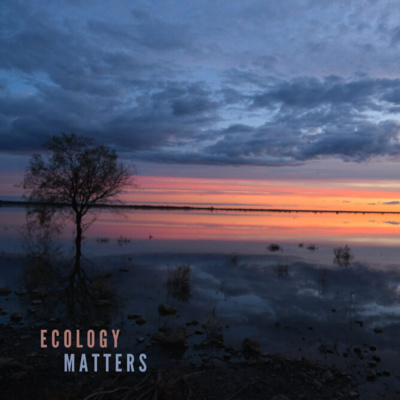
Professor Richard Kingsford
“It's an ongoing battle but I do think a lot of these major environmental problems are not really about lack of knowledge.”
Professor Kingsford is the Director of the Centre for Ecosystem Science at the University of New South Wales Sydney.
He is a river ecologist and conservation biologist whose work has improved our understanding of how water resource developments impact river and wetland ecosystems.
For over 35 years he has led the Eastern Australian Waterbird Survey, which covers about a third of the continent, and is one of the longest and most extensive surveys of ecosystems in the world.
For the past six years, he has led the Wild Deserts project, which is restoring a desert ecosystem by reintroducing seven locally-extinct mammals into Sturt National Park in north-western NSW.
Professor Kingsford’s work has been awarded both Eureka and Banksia Awards and earned him Fellowships of both the Royal Society of NSW and the Australian Zoological Society. In 2021 he was awarded the ESA Gold Medal for his outstanding contributions to ecology.
The Ecological Society of Australia acknowledges the Traditional Owners and Custodians of country throughout Australia and their connections to land, sea and community. We pay our respects to their Elders past, present and emerging.
Help the ESA support ecology in Australia by donating (www.ecolsoc.org.au/get-involved/donate/donation-form) or by becoming a member (www.ecolsoc.org.au/get-involved/become-a-member).
The music in this podcast is ‘Glow’ by Scott Buckley - www.scottbuckley.com.au.
Episode image credit: Peter Berney
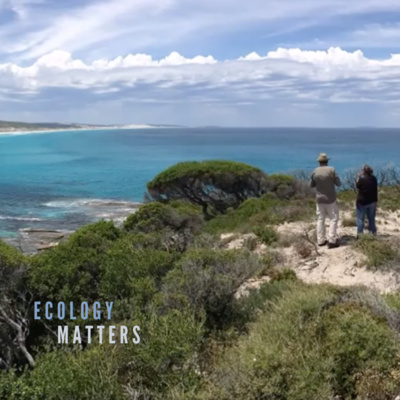
Shandell Cummings and Dr Alison Lullfitz
"There’s been that big shift where people are starting to appreciate cultural knowledge a lot more than what it would have been appreciated in the past.” - Shandell Cummings
Shandell Cummings is a Merningar woman and Indigenous consultant. Dr Alison Lullfitz is a cross-cultural researcher and conservation biologist at the University of Western Australia.
Together they explore and map the many linkages between Indigenous and western ecological knowledge, working closely with Shandell’s family in Noongar Boodja of south coast Western Australia. This work brings together different frameworks of thinking with the shared goal of improving biodiversity conservation and social wellbeing.
Shandell and Alison were awarded the 2021 Bush Heritage Australia Right Way Science Prize and recently presented at the inaugural TedX Kinjarling program. ‘Right-way’ science recognises the sovereignty, connection and knowledge of Traditional Owners across the country. Right-way science is also referred to as ‘cross-cultural’ science and ‘two-way’ science. It is an exchange of knowledge and a chance to learn based on mutual respect, responsibility and connectedness. It is a collaborative approach based on recognition of the value that each group brings to a project and when all groups have a shared interest in the outcomes. Learn more about right way science.
The Ecological Society of Australia acknowledges the Traditional Owners and Custodians of country throughout Australia and their connections to land, sea and community. We pay our respects to their Elders past, present and emerging.
Help the ESA support ecology in Australia by donating (www.ecolsoc.org.au/get-involved/donate/donation-form) or by becoming a member (www.ecolsoc.org.au/get-involved/become-a-member).
The music in this podcast is ‘Glow’ by Scott Buckley - www.scottbuckley.com.au.
Episode image credit: Alison Lullfitz.

Ecology Matters - Trailer
Ecology Matters is a podcast from the Ecological Society of Australia, a not-for-profit organisation supporting ecologists and ecological science in Australia. The first episode will launch July 2022 and can be found at www.ecolsoc.org.au/publications/audio/ecology-matters.
Meet ecologists from around Australia, discover what makes them passionate about Australian ecology, and what their hopes and fears are for the future of our natural world.
Episodes include:
> Why is Norfolk Island so special and what is threatening its unique creatures?
> How do Indigenous and western ecological knowledge intersect?
> What does the smelliness of plants have to do with how wallabies find food?
> Why are some young leaves pink before they turn green?
> How can farmers and conservationists benefit from each other’s knowledge?
> What makes a tropical rainforest burn?
> Why would an ecologist interested in wood ducks spend their time studying wetlands and rivers instead? Or a marine biologist start studying terrestrial reptiles?
> Why is TALKING about science an important part of doing science?
And more!
Meet the ecologists behind these questions, learn more about their work and why they think that ecology matters.
Help the ESA support ecology in Australia by donating (www.ecolsoc.org.au/get-involved/donate/donation-form) or by becoming a member (www.ecolsoc.org.au/get-involved/become-a-member).
The music in this podcast is ‘Glow’ by Scott Buckley - www.scottbuckley.com.au